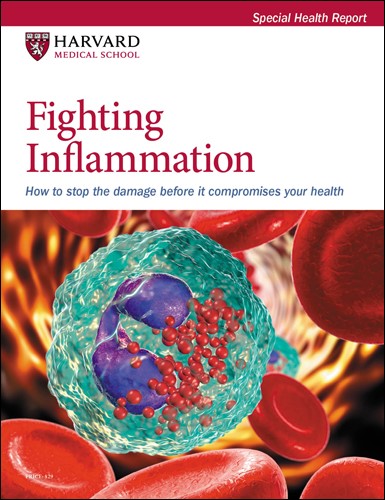Why all the buzz about inflammation — and just how bad is it?
Here's how inflammation can be helpful, harmful, and misunderstood.

Quick health quiz: how bad is inflammation for your body?
You're forgiven if you think inflammation is very bad. News sources everywhere will tell you it contributes to the top causes of death worldwide. Heart disease, stroke, dementia, and cancer all have been linked to chronic inflammation. And that's just the short list. So, what can you do to reduce inflammation in your body?
Good question! Before we get to the answers, though, let's review what inflammation is — and isn't.
Inflammation 101
Misconceptions abound about inflammation. One standard definition describes inflammation as the body's response to an injury, allergy, or infection, causing redness, warmth, pain, swelling, and limitation of function. That's right if we're talking about a splinter in your finger, bacterial pneumonia, or the rash of poison ivy. But it's only part of the story, because there's more than one type of inflammation:
- Acute inflammation rears up suddenly, lasts days to weeks, and then settles down once the cause, such as an injury or infection, is under control. Generally, acute inflammation is a reaction that attempts to restore the health of the affected area. That's the type described in the definition above.
- Chronic inflammation is quite different. It can develop for no medically apparent reason, last a lifetime, and cause harm rather than healing. This type of inflammation is often linked with chronic disease, such as:
-
- excess weight
- diabetes
- cardiovascular disease, including heart attacks and stroke
- certain infections, such as hepatitis C
- autoimmune disease
- cancer
- stress, whether psychological or physical.
Which cells are involved in inflammation?
The cells involved with both types of inflammation are part of the body's immune system. That makes sense, because the immune system defends the body from attacks of all kinds.
Depending on the duration, location, and cause of trouble, a variety of immune cells, such as neutrophils, lymphocytes, and macrophages, rush in to create inflammation. Each type of cell has its own particular role to play, including attacking foreign invaders, creating antibodies, and removing dead cells.
4 inflammation myths and misconceptions
Inflammation is the root cause of most modern illness.
Not so fast. Yes, a number of chronic diseases are accompanied by inflammation. In many cases, controlling that inflammation is an important part of treatment. And it's true that unchecked inflammation contributes to long-term health problems.
But inflammation is not the direct cause of most chronic diseases. For example, blood vessel inflammation occurs with atherosclerosis. Yet we don't know whether chronic inflammation caused this, or whether the key contributors were standard risk factors (such as high cholesterol, diabetes, and smoking — all of which cause inflammation).
You know when you're inflamed.
True for some conditions. People with rheumatoid arthritis, for example, know when their joints are inflamed because they experience more pain, swelling, and stiffness. But the type of inflammation seen in obesity, diabetes, or cardiovascular disease, for example, causes no specific symptoms. Sure, fatigue, brain fog, headaches, and other symptoms are sometimes attributed to inflammation. But plenty of people have those symptoms without inflammation.
Controlling chronic inflammation would eliminate most chronic disease.
Not so. Effective treatments typically target the cause of inflammation, rather than just suppressing inflammation itself. For example, a person with rheumatoid arthritis may take steroids or other anti-inflammatory medicines to reduce their symptoms. But to avoid permanent joint damage, they also take a medicine like methotrexate to treat the underlying condition that's causing inflammation.
Anti-inflammatory diets or certain foods (blueberries! kale! garlic!) prevent disease by suppressing inflammation.
While it's true that some foods and diets are healthier than others, it's not clear their benefits are due to reducing inflammation. Switching from a typical Western diet to an "anti-inflammatory diet" (such as the Mediterranean diet) improves health in multiple ways. Reducing inflammation is just one of many possible mechanisms.
The bottom line
Inflammation isn't a lone villain cutting short millions of lives each year. The truth is, even if you could completely eliminate inflammation — sorry, not possible — you wouldn't want to. Among other problems, quashing inflammation would leave you unable to mount an effective response to infections, allergens, toxins or injuries.
Inflammation is complicated. Acute inflammation is your body's natural, usually helpful response to injury, infection, or other dangers. But it sometimes sparks problems of its own or spins out of control. We need to better understand what causes inflammation and what prompts it to become chronic. Then we can treat an underlying cause, instead of assigning the blame for every illness to inflammation or hoping that eating individual foods will reduce it.
There's no quick or simple fix for unhealthy inflammation. To reduce it, we need to detect, prevent, and treat its underlying causes. Yet there is good news. Most often, inflammation exists in your body for good reason and does what it's supposed to do. And when it is causing trouble, you can take steps to improve the situation.
About the Author

Robert H. Shmerling, MD, Senior Faculty Editor, Harvard Health Publishing; Editorial Advisory Board Member, Harvard Health Publishing
Disclaimer:
As a service to our readers, Harvard Health Publishing provides access to our library of archived content. Please note the date of last review or update on all articles.
No content on this site, regardless of date, should ever be used as a substitute for direct medical advice from your doctor or other qualified clinician.
















